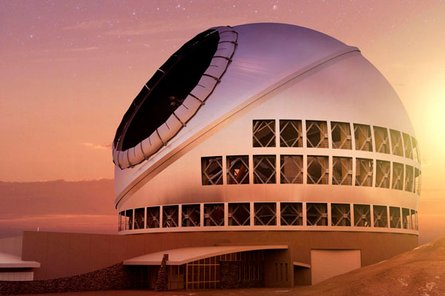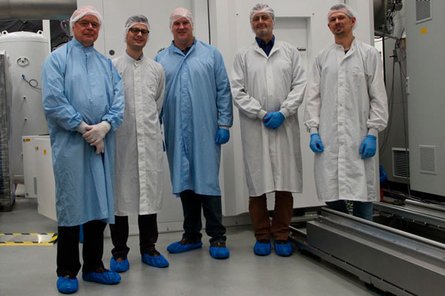Surface Polishing Test for the Thirty Meter Telescope (TMT)


Artist impression of the TMT Observatory at sunset © TMT

Ben Gallagher of TMT (middle) and the scia Systems team in front of the scia Finish 1500.
The Thirty Meter Telescope (TMT) is designed and developed by the TMT International Observatory, LLC (TIO), an international organization with members from the USA, Japan, China, India, and Canada. New ground-based extremely large optical infrared telescopes such as the TMT will allow transformational opportunities for observational astronomy and astrophysics. With its primary mirror (M1) of 30 m diameter, the TMT will provide images more than 12 times sharper than those from the Hubble Space Telescope. The construction of the TMT is scheduled to start soon, either at its prime site in Hawaii, USA, or its alternate site in La Palma, Spain. The beginning of scientific observations is planned for late 2020s.
In February 2020 scia Systems invited TMT telescope optics lead to perform a series of ion beam figuring (IBF) runs on a TMT mirror segment prototype at scia Systems’ production site in Chemnitz, Germany. The IBF processing on a scia Finish 1500 ran over 50 hours to collect valuable data about the thermal response of the low-expansion glass-ceramic CLEARCERAM-Z segment. The processed segment was shipped back to the USA afterwards to evaluate its optical quality by interferometric measurements.
“It was very nice to have the opportunity to experiment with IBF on a TMT prototype segment. Working with the scia Systems team was very efficient as the tests were carefully thought-out,” said Ben Gallagher, TMT M1 System Lead Engineer.
TMT will use IBF technologies during a final stage of segment mirror polishing for correcting any residual optical errors, providing the smoothest optical figure that meets TMT required specifications. Such a high optical precision is needed to avoid aberrations in the images of astronomical objects. In total, more than 550 segments (including spares) of 82 different surface shapes will need to be cast, precisely stress-polished and IBF-processed to form TMT’s primary mirror of 30 meters in diameter.
